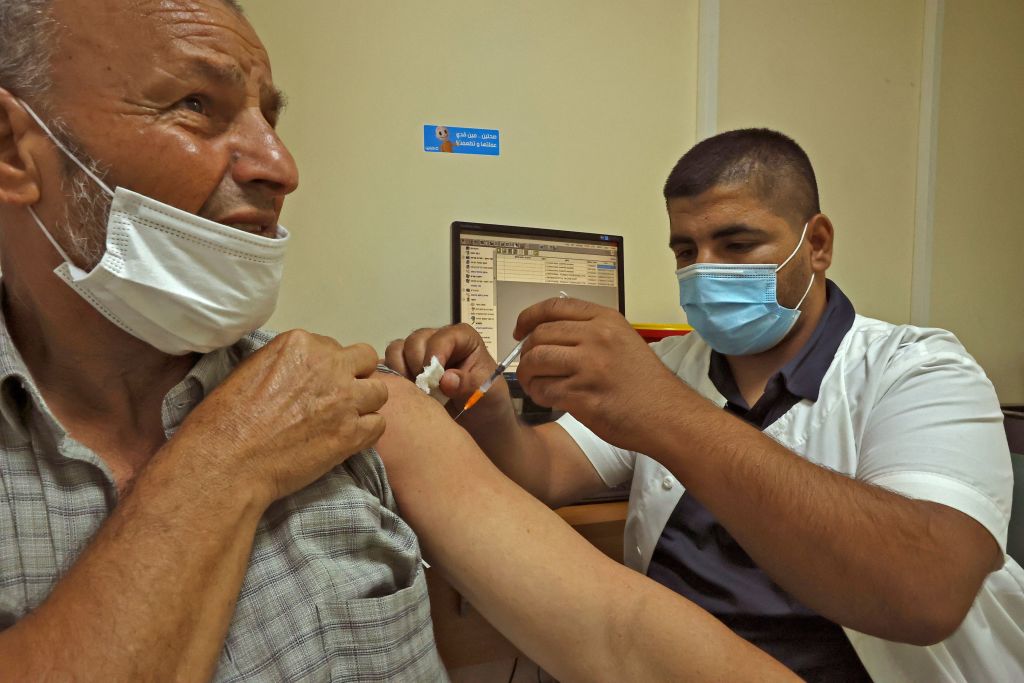3 might be the magic number for COVID-19 vaccine doses, Yale immunologist explains


A free daily email with the biggest news stories of the day – and the best features from TheWeek.com
You are now subscribed
Your newsletter sign-up was successful
The Biden administration is reportedly preparing to announce that most vaccine-eligible Americans should get a COVID-19 booster shot after eight months. Allowing booster shots for all Americans, not just those with weak immune systems, would be a little controversial, since the 200 million doses of vaccine might be better used in countries with little supply and fewer vaccinated people. But there's also the question of what happens next? Will the COVID-19 vaccine become an annual thing, like the flu shot?
Actually, "three really could prove to be the magic dosing number — if the coronavirus remains relatively stable," Renuka Rayasam writes at Politico. "Even though Delta is more infectious than previous variants, it's still the same virus as the original COVID strain. A third vaccine dose this fall wouldn't be a different formulation than the first two — your body just needs more of it. The hepatitis B vaccine, for example, requires three doses for lasting immunity.
All vaccines lose a little efficacy over time, and if it weren't for the Delta variant, there would likely be no need for boosters at all, Akiko Iwasaki, a professor of immunobiology at Yale School of Medicine, tells Politico. The Pfizer and Moderna vaccines are proving to hold up well against COVID-19, but the Delta variant carries 1,000 times the viral load as the original strain and therefore needs more vaccine to ward off serious illness, she said. If the virus mutates to the extent the vaccines aren't effective, like the flu virus continues to do, then we may need more than just three doses eventually.
The Week
Escape your echo chamber. Get the facts behind the news, plus analysis from multiple perspectives.

Sign up for The Week's Free Newsletters
From our morning news briefing to a weekly Good News Newsletter, get the best of The Week delivered directly to your inbox.
From our morning news briefing to a weekly Good News Newsletter, get the best of The Week delivered directly to your inbox.
"I just learned to be very humble with this virus because it comes up with different tricks," Iwasaki said. "It is still trying to find its sweet spot."
A free daily email with the biggest news stories of the day – and the best features from TheWeek.com
Peter has worked as a news and culture writer and editor at The Week since the site's launch in 2008. He covers politics, world affairs, religion and cultural currents. His journalism career began as a copy editor at a financial newswire and has included editorial positions at The New York Times Magazine, Facts on File, and Oregon State University.
-
 Colbert, CBS spar over FCC and Talarico interview
Colbert, CBS spar over FCC and Talarico interviewSpeed Read The late night host said CBS pulled his interview with Democratic Texas state representative James Talarico over new FCC rules about political interviews
-
 The Week contest: AI bellyaching
The Week contest: AI bellyachingPuzzles and Quizzes
-
 Political cartoons for February 18
Political cartoons for February 18Cartoons Wednesday’s political cartoons include the DOW, human replacement, and more
-
 A Nipah virus outbreak in India has brought back Covid-era surveillance
A Nipah virus outbreak in India has brought back Covid-era surveillanceUnder the radar The disease can spread through animals and humans
-
 Trump HHS slashes advised child vaccinations
Trump HHS slashes advised child vaccinationsSpeed Read In a widely condemned move, the CDC will now recommend that children get vaccinated against 11 communicable diseases, not 17
-
 Covid-19 mRNA vaccines could help fight cancer
Covid-19 mRNA vaccines could help fight cancerUnder the radar They boost the immune system
-
 FDA OKs generic abortion pill, riling the right
FDA OKs generic abortion pill, riling the rightSpeed Read The drug in question is a generic version of mifepristone, used to carry out two-thirds of US abortions
-
 The new Stratus Covid strain – and why it’s on the rise
The new Stratus Covid strain – and why it’s on the riseThe Explainer ‘No evidence’ new variant is more dangerous or that vaccines won’t work against it, say UK health experts
-
 RFK Jr. vaccine panel advises restricting MMRV shot
RFK Jr. vaccine panel advises restricting MMRV shotSpeed Read The committee voted to restrict access to a childhood vaccine against chickenpox
-
 Texas declares end to measles outbreak
Texas declares end to measles outbreakSpeed Read The vaccine-preventable disease is still spreading in neighboring states, Mexico and Canada
-
 RFK Jr. shuts down mRNA vaccine funding at agency
RFK Jr. shuts down mRNA vaccine funding at agencySpeed Read The decision canceled or modified 22 projects, primarily for work on vaccines and therapeutics for respiratory viruses
